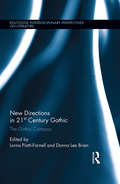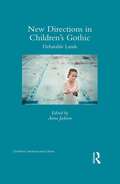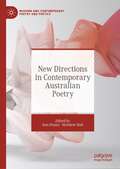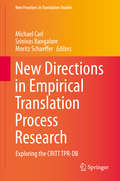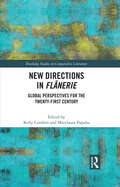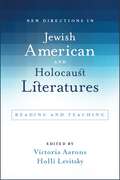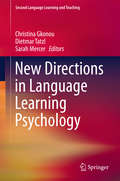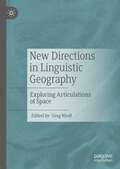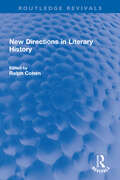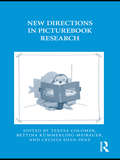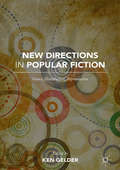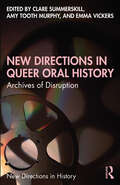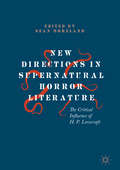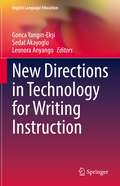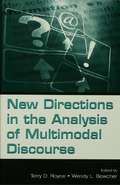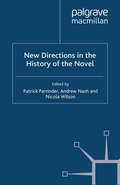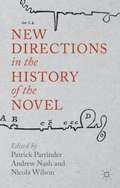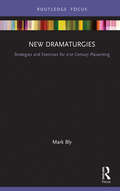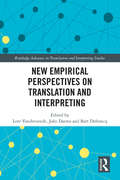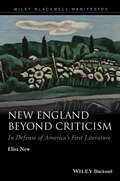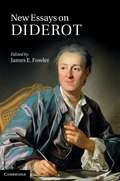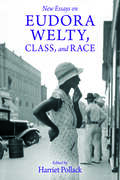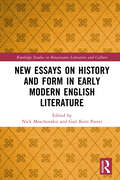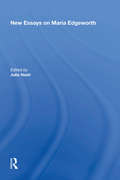- Table View
- List View
New Directions in 21st-Century Gothic: The Gothic Compass (Routledge Interdisciplinary Perspectives on Literature)
by Lorna Piatti-Farnell Donna Lee BrienThis book brings together a carefully selected range of contemporary disciplinary approaches to new areas of Gothic inquiry. Moving beyond the representational and historically based aspects of literature and film that have dominated Gothic studies, this volume both acknowledges the contemporary diversification of Gothic scholarship and maps its changing and mutating incarnations. Drawing strength from their fascinating diversity, and points of correlation, the varied perspectives and subject areas cohere around a number of core themes — of re-evaluation, discovery, and convergence — to reveal emerging trends and new directions in Gothic scholarship. Visiting fascinating areas including the Gothic and digital realities, uncanny food experiences, representations of death and the public media, Gothic creatures and their popular legacies, new approaches to contemporary Gothic literature, and re-evaluations of the Gothic mode through regional narratives, essays reveal many patterns and intersecting approaches, forcefully testifying to the multifaceted, although lucidly coherent, nature of Gothic studies in the 21st Century. The multiple disciplines represented — from digital inquiry to food studies, from fine art to dramaturgy — engage with the Gothic in order to offer new definitions and methodological approaches to Gothic scholarship. The interdisciplinary, transnational focus of this volume provides exciting new insights into, and expanded and revitalised definitions of, the Gothic and its related fields.
New Directions in Children's Gothic: Debatable Lands (Children's Literature and Culture)
by Anna JacksonChildren’s literature today is dominated by the gothic mode, and it is in children’s gothic fictions that we find the implications of cultural change most radically questioned and explored. This collection of essays looks at what is happening in the children’s Gothic now when traditional monsters have become the heroes, when new monsters have come into play, when globalisation brings Harry Potter into China and yaoguai into the children’s Gothic, and when childhood itself and children’s literature as a genre can no longer be thought of as an uncontested space apart from the debates and power struggles of an adult domain. We look in detail at series such as The Mortal Instruments, Twilight, Chaos Walking, The Power of Five, Skulduggery Pleasant, and Cirque du Freak; at novels about witches and novels about changelings; at the Gothic in China, Japan and Oceania; and at authors including Celia Rees, Frances Hardinge, Alan Garner and Laini Taylor amongst many others. At a time when the energies and anxieties of children’s novels can barely be contained anymore within the genre of children’s literature, spilling over into YA and adult literature, we need to pay attention. Weird things are happening and they matter.
New Directions in Contemporary Australian Poetry (Modern and Contemporary Poetry and Poetics)
by Matthew Hall Dan DisneyThis book sets out to navigate questions of the future of Australian poetry. Deliberately designed as a dialogue between poets, each of the four clusters presented here—“Indigeneities”; “Political Landscapes”; “Space, Place, Materiality”; “Revising an Australian Mythos”—models how poetic communities in Australia continue to grow in alliance toward certain constellated ideas. Exploring the ethics of creative production in a place that continues to position capital over culture, property over community, each of the twenty essays in this anthology takes the subject of Australian poetry definitively beyond Eurocentrism and white privilege. By pushing back against nationalizing mythologies that have, over the last 200 years since colonization, not only narrativized the logic of instrumentalization but rendered our lands precarious, this book asserts new possibilities of creative responsiveness within the Australian sensorium.
New Directions in Empirical Translation Process Research
by Srinivas Bangalore Michael Carl Moritz SchaefferThis volume provides a comprehensive introduction to the Translation Process Research Database (TPR-DB), which was compiled by the Centre for Research and Innovation in Translation and Technologies (CRITT). The TPR-DB is a unique resource featuring more than 500 hours of recorded translation process data, augmented with over 200 different rich annotations. Twelve chapters describe the diverse research directions this data can support, including the computational, statistical and psycholinguistic modeling of human translation processes. In the first chapters of this book, the reader is introduced to the CRITT TPR-DB. This is followed by two main parts, the first of which focuses on usability issues and details of implementing interactive machine translation. It also discusses the use of external resources and translator-information interaction. The second part addresses the cognitive and statistical modeling of human translation processes, including co-activation at the lexical, syntactic and discourse levels, translation literality, and various annotation schemata for the data.
New Directions in Flânerie: Global Perspectives for the Twenty-First Century (Routledge Studies in Comparative Literature)
by Kelly ComfortThis book distinguishes itself from previous scholarship by offering an inclusive and comprehensive treatment of urban walking from 1800 to the present. Divided into three sections—geography, genius, and gender—the introduction establishes the origins of the flâneur and flâneuse in early foundational texts and explores later works that reimagine flânerie in terms of these same three themes. The volume’s contributors provide new and global perspectives on urban walking practices through their treatment of a variety of genres (literature, film, journalism, autobiography, epistolary correspondence, photography, fashion, music, digital media) and regions (Europe, Asia, the Americas, Africa, the Middle East). This volume theorizes well-known urban characters like the idler, lounger, dandy, badaud, promeneuse, shopper, collector, and detective and also proposes new iterations of the flâneur/flâneuse as fashion model, gaucho, cruiser, musician, vampire, postcolonial activist, video game avatar and gamer.
New Directions in Jewish American and Holocaust Literatures: Reading and Teaching (SUNY series in Contemporary Jewish Literature and Culture)
by Victoria Aarons; Holli LevitskyWhat does it mean to read, and to teach, Jewish American and Holocaust literatures in the early decades of the twenty-first century? New directions and new forms of expression have emerged, both in the invention of narratives and in the methodologies and discursive approaches taken toward these texts. The premise of this book is that despite moving farther away in time, the Holocaust continues to shape and inform contemporary Jewish American writing. Divided into analytical and pedagogical sections, the chapters present a range of possibilities for thinking about these literatures. Contributors address such genres as biography, the graphic novel, alternate history, midrash, poetry, and third-generation and hidden-child Holocaust narratives. Both canonical and contemporary authors are covered, including Michael Chabon, Nathan Englander, Anne Frank, Dara Horn, Joe Kupert, Philip Roth, and William Styron.
New Directions in Language Learning Psychology
by Sarah Mercer Christina Gkonou Dietmar TatzlThis book explores potential new directions in the growing field of language learning psychology. The individual chapters cover theoretical and conceptual developments and innovative methodological designs, while also exploring practical implications. Language learning psychology is a vibrant field of research that typically involves constructs from social and educational psychology, which it considers in terms of their relevance for the domain of language learning. The diverse theoretical and empirical chapters examine a range of familiar and lesser-known constructs, highlighting the importance of taking into account both learner and teacher psychologies, and recognising the complexity, dynamism and situatedness of psychological constructs, as well as the value of employing diverse research methodologies. It is hoped that these 'new directions' concerning populations, constructs and theoretical and methodological frameworks will pave the way for innovative future developments in this vibrant field.
New Directions in Linguistic Geography: Exploring Articulations of Space
by Greg NiedtThis collection brings together contributions from a new wave of research into language, space, and place, at the intersection of various disciplines, from geography to sociolinguistics and linguistic anthropology. The authors investigate the myriad ways that people conceive of—and thereby describe—the world around them, studying the impact these ideas have on their identities, and highlighting the tension between conflicting ontologies of space.It is a timely and invaluable new resource for researchers and students in linguistics, geography, anthropology and communication.
New Directions in Literary History (Routledge Revivals)
by Ralph CohenFirst published in 1974, New Directions in Literary History is a comprehensive attempt to present approaches to literary studies that have developed from phenomenology, stylistics and linguistics, Marxist reconsiderations of literature, interdisciplinary studies and analysis of reader response. Written by an international group of scholars, the essays are taken from the pages of New Literary History. They range from the Middle Ages to contemporary literature. European and American literary critics are here represented, together with an art critic, a philosopher and a novelist. Their essays deal with crucial problems in the study of literature: the relationship of the contemporary critic to works of the past; the place of method in literary study; how reading takes place; the role of the reader in different literary periods in providing a guide to interpretation; the language of literature and its relation to natural or ordinary language; the origin and decline of literary forms; and what constitutes literature, especially in the relation between fictional character and autobiography. Although the essays are essentially concerned with theoretical issues, they also examine the practical applications to literature. Students of English literature and literary theory will find this book particularly interesting.
New Directions in Picturebook Research (Children's Literature And Culture Ser. #70)
by Teresa ColomerIn this new collection, children’s literature scholars from twelve different countries contribute to the ongoing debate on the importance of picturebook research, focusing on aesthetic and cognitive aspects of picture books. Contributors take interdisciplinary approaches that integrate different disciplines such as literary studies, art history, linguistics, narratology, cognitive psychology, sociology, memory studies, and picture theory. Topics discussed include intervisuality, twist endings, autobiographical narration, and metaliterary awareness in picturebooks. The essays also examine the narrative challenges of first-person narratives, ellipsis, and frame-breaking in order to consider the importance of mindscape as a new paradigm in picturebook research. Tying picturebook studies to studies in childhood, multimodality, and literacy, this anthology is a representative of the different opportunities for research in this emerging field.
New Directions in Popular Fiction
by Ken GelderThis book brings together new contributions in Popular Fiction Studies, giving us a vivid sense of new directions in analysis and focus. It looks into the histories of popular genres such as the amatory novel, imperial romance, the western, Australian detective fiction, Whitechapel Gothic novels, the British spy thriller, Japanese mysteries, the 'new weird', fantasy, girl hero action novels and Québecois science fiction. It also examines the production, reproduction and distribution of popular fiction as it carves out space for itself in transnational marketplaces and across different media entertainment systems; and it discusses the careers of popular authors and the various investments in popular fiction by readers and fans. This book will be indispensable for anyone with a serious interest in this prolific but highly distinctive literary field.
New Directions in Queer Oral History: Archives of Disruption (New Directions in History)
by Emma Vickers Clare Summerskill Amy Tooth MurphyThis comprehensive international collection reflects on the practice, purpose, and functionality of queer oral history, and in doing so demonstrates the vibrancy and innovation of this rapidly evolving field. Drawing on the roots of oral history’s original commitment to "history from " queer oral history has become an indispensable methodology at the heart of queer studies. Expanding and extending the existing canon, this book offers up key observations about queer oral history as a methodology, and how it might be advanced through cutting edge approaches. The collection contains a mix of contributions from established scholars, early career researchers, postgraduate students, archivists, and activists, ensuring its accessibility and wide appeal. The go-to reference for queer oral history for scholars, undergraduate and postgraduate students, and community-engaged practitioners, New Directions in Queer Oral History advances rigorous methodological and theoretical debates and constitutes a significant intervention in the world of oral history.
New Directions in Supernatural Horror Literature: The Critical Influence of H. P. Lovecraft
by Sean MorelandThis collection of essays examines the legacy of H.P. Lovecraft’s most important critical work, Supernatural Horror in Literature. Each chapter illuminates a crucial aspect of Lovecraft’s criticism, from its aesthetic, philosophical and literary sources, to its psychobiological underpinnings, to its pervasive influence on the conception and course of horror and weird literature through the twentieth and early twenty-first centuries. These essays investigate the meaning of cosmic horror before and after Lovecraft, explore his critical relevance to contemporary social science, feminist and queer readings of his work, and ultimately reveal Lovecraft’s importance for contemporary speculative philosophy, film and literature.
New Directions in Technology for Writing Instruction (English Language Education #30)
by Gonca Yangın-Ekşi Sedat Akayoglu Leonora AnyangoThis book responds to the changes and needs of English Language Learning by offering insight into online writing pedagogical platforms and atmospheres. Language learning enriched with technology, web tools and applications have become a necessary ingredient in language education internationally. This volume provides an in-depth understanding of writing practices that are responsive to the challenges for teaching and learning writing in local and global contexts of education. It also provides succinct knowledge at the intersection of technology with teaching, learning, and research. The chapters herein creatively take advantage of the affordances of digital platforms and further critiques their limitations. The book also delineates knowledge on concepts, theories, and innovative approaches to digital writing in the field of teaching and learning English. The chapters focus on reviews and provide guidance on the practical use of Web 2.0 and multimedia tools as well as presenting research on technology integration in writing classes.
New Directions in the Analysis of Multimodal Discourse
by Wendy L. Bowcher Terry D. RoyceNew Directions in the Analysis of Multimodal Discourse offers a comprehensive international view of multimodal discourse and presents new directions for research and application in this growing field. With contributions from top scholars around the world, this work opens up the field of multimodal discourse analysis as it covers a wide range of interests such as computational linguistics, education, ideology, and media discourse. The range and scope of the chapters in this book provide groundbreaking insights into exploring and accounting for the various facets of multimodality in a range of texts and contexts. Initial chapters specifically aim to tackle theoretical issues, while subsequent chapters focus on important research areas such as writing and graphology, genre, ideology, computational concordancing, literacy, and cross cultural and cross linguistic issues. In the final chapters, an emphasis is placed on the educational implications of multimodality in first and second language contexts, a particularly new and interesting contribution.
New Directions in the History of the Novel
by P. Parrinder A. Nash N. WilsonNew Directions in the History of the Novel challenges received views of literary history and sets out new areas for research. A re-examination of the nature of prose fiction in English and its study from the Renaissance to the 21st century, it will become required reading for teachers and students of the novel and its history.
New Directions in the History of the Novel
by Patrick Parrinder Andrew Nash Nicola WilsonWhat exactly, and when, was the 'rise' of the novel? Is its dominance now over? How have material conditions, habits of reading, and authors' reactions to the changing international marketplace helped to shape the novel as a form? In a series of studies of British, American and postcolonial fiction from the 17th to the 21st century, New Directions in the History of the Novel challenges conventional accounts and sets out new areas for teaching and research. It includes separate sections on 'The Material Text', 'Questions of Realism and Form', 'The Novel in National and Transnational Cultures', and 'The Novel Now'. With contributions from leading scholars of the novel, this stimulating collection is required reading for teachers and students of the novel and its history.
New Dramaturgies: Strategies and Exercises for 21st Century Playwriting (Focus on Dramaturgy)
by Mark BlyIn New Dramaturgies: Strategies and Exercises for 21st Century Playwriting, Mark Bly offers a new playwriting book with nine unique play-generating exercises. These exercises offer dramaturgical strategies and tools for confronting and overcoming obstacles that all playwrights face. Each of the chapters features lively commentary and participation from Bly’s former students. They are now acclaimed writers and producers for media such as House of Cards, Weeds, Friday Night Lights, Warrior, and The Affair, and their plays appear onstage in major venues such as the Roundabout Theatre, Yale Rep, and the Royal National Theatre. They share thoughts about their original response to an exercise and why it continues to have a major impact on their writing and mentoring today. Each chapter concludes with their original, inventive, and provocative scene generated in response to Bly’s exercise, providing a vivid real-life example of what the exercises can create. Suitable for both students of playwriting and screenwriting, as well as professionals in the field, New Dramaturgies gives readers a rare combination of practical provocation and creative discussion.
New Empirical Perspectives on Translation and Interpreting (Routledge Advances in Translation and Interpreting Studies)
by Bart Defrancq Lore Vandevoorde Joke DaemsDrawing on work from both eminent and emerging scholars in translation and interpreting studies, this collection offers a critical reflection on current methodological practices in these fields toward strengthening the theoretical and empirical ties between them. Methodological and technological advances have pushed these respective areas of study forward in the last few decades, but advanced tools, such as eye tracking and keystroke logging, and insights from their use have often remained in isolation and not shared across disciplines. This volume explores empirical and theoretical challenges across these areas and the subsequent methodologies implemented to address them and how they might be mutually applied across translation and interpreting studies but also brought together toward a coherent empirical theory of translation and interpreting studies. Organized around three key themes—target-text orientedness, source-text orientedness, and translator/interpreter-orientedness—the book takes stock of both studies of translation and interpreting corpora and processes in an effort to answer such key questions, including: how do written translation and interpreting relate to each other? How do technological advances in these fields shape process and product? What would an empirical theory of translation and interpreting studies look like? Taken together, the collection showcases the possibilities of further dialogue around methodological practices in translation and interpreting studies and will be of interest to students and scholars in these fields.
New England Beyond Criticism: In Defense of America's First Literature (Wiley-Blackwell Manifestos)
by Elisa NewTimely and beautifully written, New England Beyond Criticism provides a passionate defense of the importance of the literature of New England to the American literary canon, and its impact on the development of spirituality, community, and culture in America. An exploration and defense of the prominence of New England’s literary tradition within the canon of American literature Traces the impact of the literature of New England on the development of spirituality, community, and culture in America Includes in-depth studies of work from authors and poets such as William Bradford, Emily Dickinson, Robert Frost, Henry David Thoreau, Susan Howe, and Marilynne Robinson Examines the place and impression of New England literature in the nation’s intellectual history and the lives of its readers
New Essays on Diderot
by James FowlerThe great eighteenth-century French thinker Denis Diderot (1713-1784) once compared himself to a weathervane, by which he meant that his mind was in constant motion. In an extraordinarily diverse career he produced novels, plays, art criticism, works of philosophy and poetics, and also reflected on music and opera. Perhaps most famously, he ensured the publication of the Encyclopédie, which has often been credited with hastening the onset of the French Revolution. Known as one of the three greatest philosophes of the Enlightenment, Diderot rejected the Christian ideas in which he had been raised. Instead, he became an atheist and a determinist. His radical questioning of received ideas and established religion led to a brief imprisonment, and for that reason, no doubt, some of his subsequent works were written for posterity. This collection of essays celebrates the life and work of this extraordinary figure as we approach the tercentenary of his birth.
New Essays on Eudora Welty, Class, and Race (Critical Perspectives on Eudora Welty)
by Harriet PollackContributions by Jacob Agner, Susan V. Donaldson, Sarah Gilbreath Ford, Stephen M. Fuller, Jean C. Griffith, Ebony Lumumba, Rebecca Mark, Donnie McMahand, Kevin Murphy, Harriet Pollack, Christin Marie Taylor, Annette Trefzer, and Adrienne Akins Warfield The year 2013 saw the publication of Eudora Welty, Whiteness, and Race, a collection in which twelve critics changed the conversation on Welty’s fiction and photography by mining and deciphering the complexity of her responses to the Jim Crow South. The thirteen diverse voices in New Essays on Eudora Welty, Class, and Race deepen, reflect on, and respond to those seminal discussions. These essays freshly consider such topics as Welty’s uses of African American signifying in her short stories and her attention to public street performances interacting with Jim Crow rules in her unpublished photographs. Contributors discuss her adaptations of gothic plots, haunted houses, Civil War stories, and film noir. And they frame Welty’s work with such subjects as Bob Dylan’s songwriting, the idea and history of the orphan in America, and standup comedy. They compare her handling of whiteness and race to other works by such contemporary writers as William Faulkner, Richard Wright, Toni Morrison, Chester Himes, and Alice Walker. Discussions of race and class here also bring her masterwork The Golden Apples and her novel Losing Battles, underrepresented in earlier conversations, into new focus. Moreover, as a group these essays provide insight into Welty as an innovative craftswoman and modernist technician, busily altering literary form with her frequent, pointed makeovers of familiar story patterns, plots, and genres.
New Essays on History and Form in Early Modern English Literature (Routledge Studies in Renaissance Literature and Culture)
by Nick Moschovakis Gail Kern PasterThis volume convenes eight noted scholars with varied positions at the interface of formal and historical literary criticism. The editors’ introduction—a far-reaching account of how both methods have intersected in studies of early modern English texts since the 1990s—is the first such survey in more than 15 years, making it invaluable to scholars entering this area. Three essays address foundational questions about genre, fictionality, and formlessness; five feature close readings of texts or passages ranging from the more canonical (Shakespeare, Herbert, Milton) to the less so (an official record of the 1604 Hampton Court Conference). For scholars and students alike, the book thus models a variety of ways both to conceptualize and to analyze the value of literature at the formal–historical interface. Encompassing drama, lyric, satirical and polemical prose, and metrical as well as rhetorical and logical forms, the collection closes with an afterword by theorist Caroline Levine.
New Essays on John Clare
by Kövesi, Simon and McEathron, Scott Simon Kövesi Scott MceathronJohn Clare (1793–1864) has long been recognized as one of England's foremost poets of nature, landscape and rural life. Scholars and general readers alike regard his tremendous creative output as a testament to a probing and powerful intellect. Clare was that rare amalgam ‒ a poet who wrote from a working-class, impoverished background, who was steeped in folk and ballad culture, and who yet, against all social expectations and prejudices, read and wrote himself into a grand literary tradition. All the while he maintained a determined sense of his own commitments to the poor, to natural history and to the local. Through the diverse approaches of ten scholars, this collection shows how Clare's many angles of critical vision illuminate current understandings of environmental ethics, aesthetics, Romantic and Victorian literary history, and the nature of work.
New Essays on Maria Edgeworth (The\nineteenth Century Ser.)
by Julie NashDevoted to the varied writings of the influential novelist, children's author, and educator, this collection situates Edgeworth's writing in the context of her life and times. Combining postcolonial, historical, and gender criticism, the contributors offer fresh readings of Edgeworth's novels, stories, letters, and educational texts, including Belinda, Moral Tales, Practical Education, Helen, and The Absentee. Throughout her work, Edgeworth confronts a world whose values, while grounded in tradition and supported by slavery and colonial domination, are being challenged and ultimately changed in surprising ways by women, peasants, servants, and other voices from the margins. In discussing Edgeworth and her writing, the contributors also offer innovative perspectives on the novel and other central issues of eighteenth- and nineteenth-century literature. The collection will be invaluable to established scholars working in eighteenth- and nineteenth-century literature, women's studies, and children's literature, as well as to students encountering Edgeworth for the first time.
